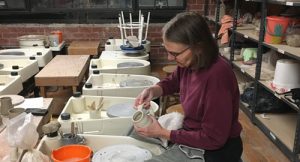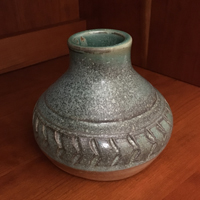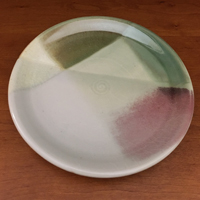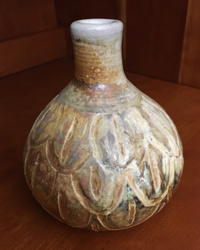 Roughly three years ago, Polly Ferguson, MD, a physicianscientist and director of the rheumatology, allergy and immunology department at the University of Iowa Stead Family Children’s Hospital, Iowa City, Iowa, took the first step toward realizing a dream she has had for nearly 30 years: becoming a skilled potter.
Roughly three years ago, Polly Ferguson, MD, a physicianscientist and director of the rheumatology, allergy and immunology department at the University of Iowa Stead Family Children’s Hospital, Iowa City, Iowa, took the first step toward realizing a dream she has had for nearly 30 years: becoming a skilled potter.
In 2017, she signed up to take her first pottery class at a nonprofit ceramic and glass center just 30 minutes from her home. She’ll always remember the first time she sat down at a potter’s wheel. Unbeknownst to Dr. Ferguson, the last artist to use the machine had left it on and, after she placed a ball of clay on the wheel, it spun around very fast. Bits of clay flew off in every direction. It was a novice mistake—not checking that the wheel was off or the pedal was pressed all the way down. A mistake she would never repeat.
Since then, Dr. Ferguson has spent up to six hours each week at the center, creating more than 100 vases, pots, plates and other pottery pieces, while learning creative techniques from experienced potters.
Academic & Career Accomplishments
Dr. Ferguson earned her medical degree in 1990 from the Roy J. and Lucille A. Carver College of Medicine at the University of Iowa, Iowa City. Her post-graduate training at the University of Virginia, Charlottesville, included a pediatric internship from 1990–’91, a pediatric residency during the next two years, a pediatric immunology and rheumatology fellowship from 1993–’97 and a postdoctoral research fellowship from 1997–’99. Then she served as a research associate and pediatric fellow at the school from 1999–2000.
Two years later, she joined the faculty at the University of Iowa as an assistant professor in pediatrics and, in 2016, was promoted to a full professor.
Over the years, Dr. Ferguson has received many honors and recognitions, including the ACR’s 2019 Distinguished Service Award. For the past decade, she has also directed a research laboratory at the University of Iowa funded by the National Institutes of Health (NIH), which focuses on pediatric auto-inflammatory bone disease. She has also served on many ACR/ARP committees, including the PRSYM Abstract Review Committee and JIA Guideline Development Group. In 2018, she began serving a five-year term on the Board of Scientific Counselors at the NIH’s National Institute of Allergy and Infectious Diseases.
Despite her vast array of experiences and accomplishments, Dr. Ferguson found room in her days to enhance her personal life. “About five years ago, I met a potter who told me that it took 10 years to become proficient at pottery,” Dr. Ferguson says. “So I started thinking about how I’m running out of 10-year increments and better get going. Because my children are grown and out of the house, I wanted to start doing the things I had put off while raising them.”
Exposed to the arts early by her mother, who has taught ceramics at her home for the past 50 years, Dr. Ferguson grew interested in learning how to throw pots using a potter’s wheel.
“Pottery is a natural extension of ceramics,” Dr. Ferguson says, adding that she creates pottery at the center because it’s a very messy art form and requires extensive and expensive equipment. “I wanted to learn how to conquer that big blob of clay, making it into something symmetrical and beautiful. The center’s artists collaborate with me and help me troubleshoot. I’ve made more progress working with them than if I worked in isolation at my house.”
The Exploding Vase
But even surrounded by a talented group of potters, sculptors and other types of artists, things can still go wrong.
Dr. Ferguson recalls the time one of her large vases exploded in a kiln. She says someone accidentally changed the kiln’s setting, which caused the explosion.
“It was the biggest thing I had ever made, and it exploded,” Dr. Ferguson says, adding that she tried to calm her horrified teacher by presenting her with a doctor’s perspective. “I told her that no one was hurt, sick or had died. And I had fun making it, learned how to handle a huge item and about color combinations for different glazes. So my exploding pot turned out to be a very positive thing.”
Planning for Retirement
After three years, Dr. Ferguson still considers herself a beginner and hopes to advance her pottery skills during retirement. “It will keep my mind busy,” she says, noting that she will enjoy learning more techniques, such as different ways to fire clay and how to decorate it with glazes.
Some of her friends admire her art and occasionally ask to purchase a piece or two. Dr. Ferguson gives them the items instead, believing her pieces are not yet good enough to sell.
Meanwhile, Dr. Ferguson compares creating pottery to meditation, explaining that the pottery wheel has a gentle, soothing rhythm that enables her to escape from her daily grind and pressures as a rheumatologist.
“It’s really very relaxing,” she says. “This is a creative outlet that allows me to center myself, use my hands and create something beautiful out of nothing.”
Carol Patton, a freelance writer based in Las Vegas, writes the Rheum After 5 column for The Rheumatologist.





